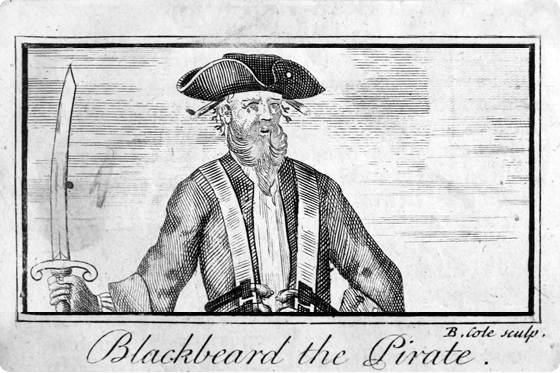
In 1996, Intersal, Inc., a marine salvage company, discovered Blackbeard’s sunken pirate ship off the coast of North Carolina. Blackbeard had seized the French slave ship in 1717, renaming it the Queen Anne’s Revenge. He navigated the vessel through the Caribbean and up the North American coast. The vessel’s tenure as a pirate ship was cut short in 1718 when Blackbeard ran it aground on a sandbar off the coast of Beaufort, North Carolina. Under state and federal law, the wreck belongs to the state. The state contracted with Intersal to recover the shipwreck. Intersal contracted with Allen to document the operation. Allen made videos and photos of the recovery efforts, registering copyrights for his works.
In 2013, Allen objected when North Carolina published some of his works on a state website without his permission. The state settled with Allen for $15,000, but the North Carolina Legislature later passed “Blackbeard’s Law,” which made “all photographs, video records, or other documentary materials of a derelict vessel or shipwreck,” and “relics, artifacts or historic materials” in the custody of the State or a state agency public record. The law essentially designated all of Allen’s photos and videos from the shipwreck as public works. The state subsequently used Allen’s videos and photographs without his permission, and Allen filed suit in the U.S. District Court for the Eastern District of North Carolina. The district court sided with Allen, dismissing the state’s sovereign immunity argument. On appeal, the Fourth Circuit overturned the decision and Allen appealed to the U.S. Supreme Court.
On appeal, the Supreme Court had to decide whether sovereign immunity protected the state from the copyright infringement suit or if a federal copyright statute waived that immunity. Sovereign immunity prevents courts from hearing suits brought by individuals against a non-consenting state. However, sovereign immunity may be waived if two conditions are met: 1) Congress must have enacted unquestionably clear language abrogating the states’ immunity from the suit, and 2) a constitutional provision must permit Congress to abrogate the states’ sovereignty.
Allen claimed the Copyright Remedy Clarification Act of 1990 (CRCA) removed a states’ sovereign immunity in copyright infringement cases. Although it was clear that that Congress’s passage of the CRCA met the first condition, it wasn’t evident that it met the second.
The Court first dealt with whether Article I of the U.S. Constitution could be used to waive sovereign immunity. Following precedent from another Supreme Court case, the Court held that Congress’ Article I power to provide copyright protection did not authorize Congress to waive state immunity from copyright infringement suits. (See Fla. Prepaid Postsecondary Educ. Expense Bd. v. Coll. Sav. Bank, 527 U.S. 627, 119 S. Ct. 2199, 144 L. Ed. 2d 575 (1999).) In Florida Prepaid, the Court held Article I could not be used to authorize Congress to waive state sovereign immunity in patent cases under the Patent Remedy Act. The Court explained that to overrule Florida Prepaid, it would need a “special justification.” As the Court noted, “Allen offers us nothing special at all … .” (Allen, 2020 WL 1325815, at *6.)
Next, the Court addressed whether Section 5 of the Fourteenth Amendment would give Congress authority to waive immunity from copyright infringement suits. The Court noted that the Fourteenth Amendment prohibits states from depriving “any person of life, liberty, or property, without due process of law.” Congress may enforce this prohibition through Section 5. The Court has consistently held that Congress may use Section 5 as a basis to waive sovereign immunity and subject states to suit in federal court; however, “[f]or an abrogation statute to be ‘appropriate’ under Section 5, it must be tailored to ‘remedy or prevent’ conduct infringing the Fourteenth Amendment’s substantive prohibitions.” (Allen, 2020 WL 1325815, at *6.) The Court examined whether Congress’s enactment of the CRCA was in line with the Fourteenth Amendment. “For Congress’s action to fall within its Section 5 authority, we have said, ‘[t]here must be a congruence and proportionality between the injury to be prevented or remedied and the means adopted to that end.’” (Allen, 2020 WL 1325815, at *6.) In Florida Prepaid, the Court held that the Patent Remedy Act’s “indiscriminate scope” was too “out of proportion” to any due process problem. (Allen, 2020 WL 1325815, at *7.) Given the identical scope of the CRCA and the Patent Remedy Act, the Court found that it could not reach a different result than it achieved in Florida Prepaid. The CRCA could not pass the “congruence and proportionality test,” as the indiscriminate scope was out of proportion to any due process problem.
Ultimately, the Supreme Court ruled unanimously in favor of North Carolina. Justice Elena Kagan wrote for the court. The opinion suggested that Congress could enact a more tailored copyright protection law in the future that addressed the “congruence and proportionality” test. “That kind of tailored statute can effectively stop States from behaving as copyright pirates. Even while respecting constitutional limits, it can bring digital Blackbeards to justice.” (Allen, 2020 WL 1325815, at *9.)
In a concurrence, Justice Clarence Thomas contended that the Court should not advise Congress on its legislative authority. He also expressed that the approach requiring “special justifications” to overcome precedent “does not comport with our judicial duty under Article III.” (Allen, 2020 WL 1325815, at *9.). Finally, he noted his belief that the question of whether copyrights are property for purposes of the Fourteenth Amendment Due Process clause has not been answered.
Justice Stephen Breyer also wrote a concurrence, with Justice Ruth Bader Ginsburg joining. Breyer questioned why an individual injured by a state’s violation of its duty to protect property had no redress. “[O]ne might think that Walt Disney Pictures could sue a State (or anyone else) for hosting an unlicensed screening of the studio’s 2003 blockbuster film, Pirates of the Caribbean (or any one of its many sequels).” (Allen, 2020 WL 1325815, at *10.) However, recognizing that Florida Prepaid precedent controlled, he concurred in the judgment.












